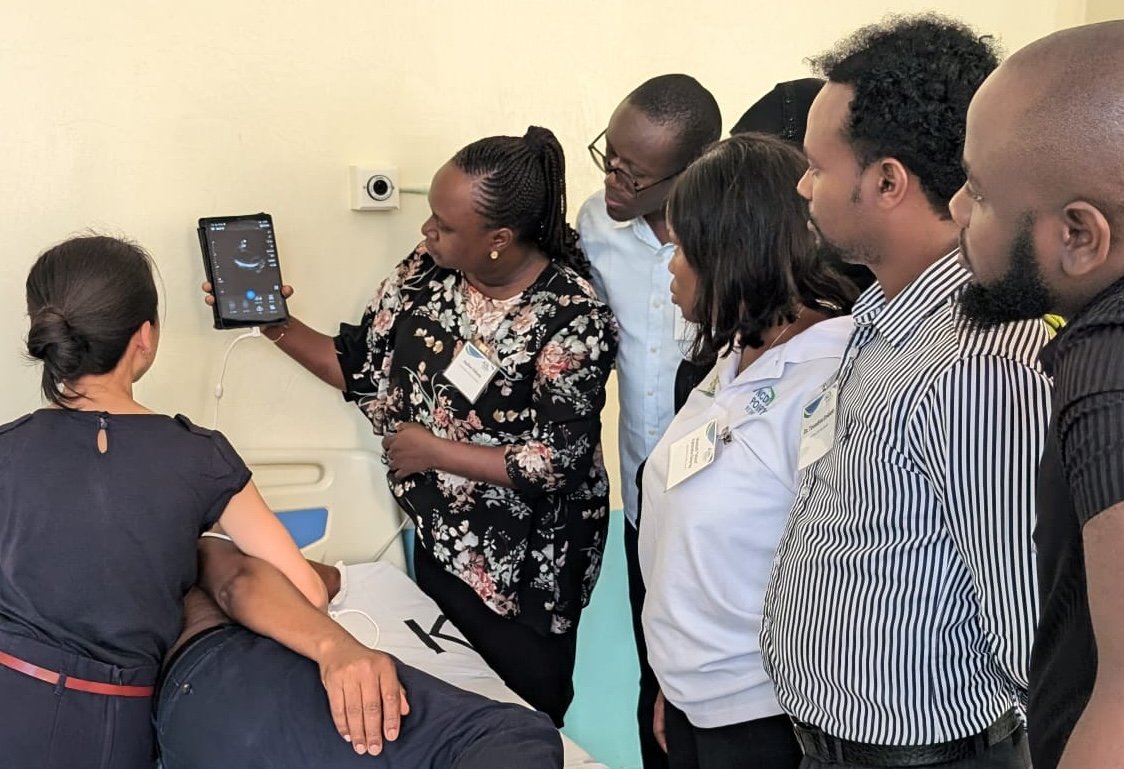Creating a Training “Echo”
A recent intensive teaching course in Kenya aimed to turn care providers already proficient in echocardiography into master trainers.
Master trainer Joyline Chihota from Zimbabwe explains echocardiography concepts to her peers during the April 2025 master training session at Isiolo County Teaching and Referral Hospital in Isiolo, Kenya. (Photo: Katia Domingues/NCDI Poverty Network)
A recent training session in echocardiography brought seven care providers from five countries to Isiolo, Kenya—but the goal wasn’t to learn about heart imaging.
The goal was to learn how to teach heart imaging to care providers back home.
Dr. Sheila Klassen, assistant director for cardiac integration at the Center for Integration Science in Global Health Equity at Brigham and Women’s Hospital, said the five-day, mid-April training event provided new skills and certification for “master trainers” who will now be able to train medical colleagues in their home countries in echocardiography, expanding local access to high-quality cardiac care for patients and communities.
Supporting training for local health facilities is a key pillar of PEN-Plus, a care delivery model for the treatment of severe, chronic noncommunicable diseases such as type 1 diabetes, sickle cell disease, and childhood heart disease in lower-income countries.
Dr. Klassen said the seven care providers were evaluated for their echocardiography experience and proficiency in advance of the training to ensure the sessions could focus on educational skills rather than clinical ones.
“We wanted to train on things like how you teach other people, how you give feedback, and what makes you effective when giving a presentation, as opposed to how you diagnose patients,” Dr. Klassen said.
The training was held at Isiolo County Teaching and Referral Hospital and hosted by NCD Alliance Kenya, an implementing partner of the NCDI Poverty Network.
As countries plan to implement PEN-Plus and scale the model nationwide, expanding the skillsets of care providers at smaller, lower-level health facilities is crucial. But many countries face limited availability of subspecialists who can provide training in skills such as echocardiography, Dr. Klassen said, creating a need for local experts who can teach other care providers in their communities.
“It makes scale-up less resource-intensive, because you don’t need someone from elsewhere to do the training,” Dr. Klassen said. “The person doing the training is already a PEN-Plus clinician working with the local PEN-Plus implementing organization.”
Dr. Klassen said the training model has proven successful in Rwanda and Malawi, where PEN-Plus implementation is nationwide or nearly so.
The seven care providers who attended the April session were:
· Dickson Banda, a registered nurse for CIDRZ in Zambia;
· Joyline Chihota, a registered nurse for SolidarMed in Zimbabwe;
· Dr. Tewodros Embiale, a physician with Mathiwos Wondu-YeEthiopia Cancer Society in Ethiopia;
· Amadu Gbandeh, a clinical officer and coordinator for Partners In Health in Sierra Leone;
· Tharmi Hussein, a registered clinical officer for NCD Alliance Kenya;
· Philemon Nambasa, a registered clinical officer for NCD Alliance Kenya; and
· Massah “Mimi” Fatmata Swaray, a registered nurse for Doctors with Africa CUAMM in Sierra Leone.
All seven are now certified trainers in echocardiography, a heart imaging method that helps care providers detect the presence of heart disease and determine the type. The training program focuses on the types of heart disease most commonly seen in PEN-Plus clinics: rheumatic, congenital, and cardiomyopathy.
The certification of seven new trainers translates into seven additional communities with high-quality mentorship and the ability to train more providers in diagnosis and management of heart disease in PEN-Plus clinics.
“National scale will not be achieved with subspecialists,” Dr. Klassen said. “It will happen with PEN-Plus providers and peer-to-peer teaching.”

